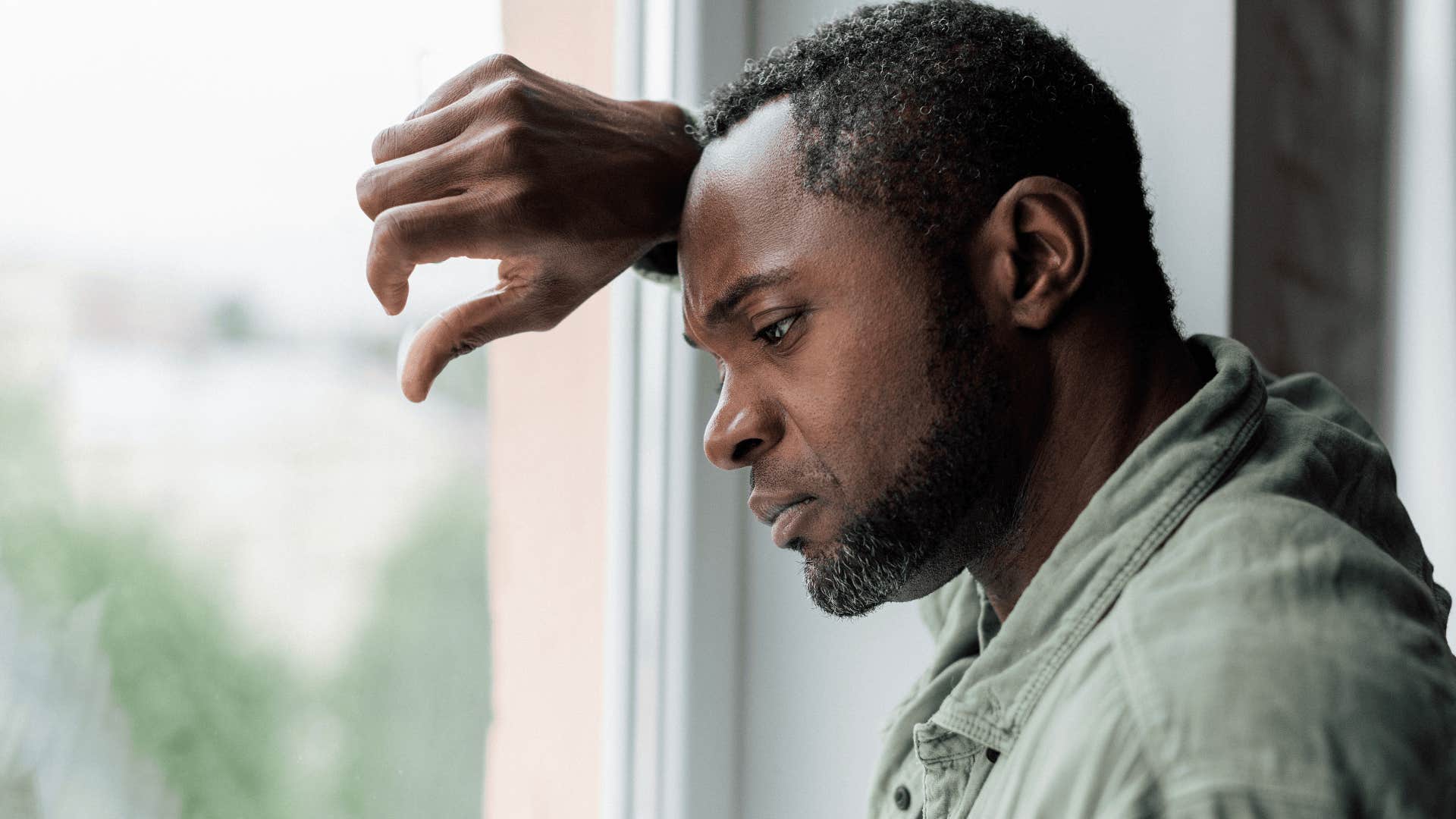11 Signs Of A Great Man Who Is Hurting Deep Down
Vulnerability is necessary to help men heal their trauma, yet it's still ridiculed in society.
 Romanchini | Shutterstock
Romanchini | Shutterstock The prevalence of mental illness in men is often lower than women — not because they don't share similar struggles, but because they're much less likely to seek out support or report it, according to a study from the American Journal of Men's Health. Faced with unique mental health stigmas, misguided masculine stereotypes around "toughness," and personal beliefs stemming from childhood trauma and unmet needs, many great men struggle with personal growth and relationships time and time again.
However, these struggles with mental health and societal norms don't make men inherently toxic, but there are many signs of a great man who is hurting deep down that are demonized and misunderstood. From struggling with vulnerability in relationships to relying on distractions to cope with emotional turmoil, there are a lot of men who simply don't have the support they need to acknowledge their trauma and healthily move forward.
Here are 11 signs of a great man who is hurting deep down
1. He can't listen without getting angry or defensive
 Srdjan Randjelovic | Shutterstock
Srdjan Randjelovic | Shutterstock
A great deal of empathetic, loving, and kind men yearn for the kind of affection, loyalty, and attention a healthy relationship brings, but don't have the tools to seek it out in a healthy manner. For example, they may try to actively listen to their partners or have discussions around boundaries, but when their spouse or friends express their needs, they can't help but get defensive and view it as a personal attack.
According to psychotherapist Avrum Weiss, PhD, the strong emotions and investment a relationship sparks can be uncomfortable for many emotionally misunderstood men. They've been taught, growing up in traditional families or navigating the adult world, that vulnerability and emotional expressions are a sign of weakness.
So, when their partner opens up a conversation or asks them to express their own emotions, they resort to anger and frustration, confused by their internal misguided truths about masculinity and their desire to show up in a healthy relationship.
2. He has a lot of distractions
 Stock 4You | Shutterstock
Stock 4You | Shutterstock
Experts, like psychology professor Matthew Tull, PhD, argue that temporary distractions can be incredibly helpful for people coping with trauma, PTSD, and other mental illnesses, but when they're consistently used to avoid vulnerability and detach from true healing, they can transform into a toxic ritual.
Whether it's unhealthy vices, entertainment, or working long hours, one of the signs of a great man who is hurting deep down is their reliance on distractions to cope with emotional turmoil, grief, shame, or trauma.
The right distractions — spending time with friends, journaling, or working out — can keep people from relying on unhealthy coping mechanisms, but when used too often, they're only keeping great men from seeking the support they truly need.
The insecurity that these men often experience in tandem with their emotional traumas doesn't make them bad people, it simply plays a role in holding them back from their true purpose, healing journey, or goals.
3. He refuses to seek help or advice
 Marjan Apostolovic | Shutterstock
Marjan Apostolovic | Shutterstock
Even the greatest men still occasionally fall victim to toxic masculinity standards and social stigmas, many of which keep struggling individuals from getting the help they need, making connections that add to their quality of life, and building a secure self-esteem.
According to a 1999 study on men's health, many men's pattern of seeking out support and guidance is indirect — their fears of judgment, vulnerability, and denial, largely rooted in the patriarchy and societal norms, alongside emotional turmoil and trauma, keep them from comfortably asking for help when they need it.
From subtle moments where they need guidance with a project at work to largely admissions of their mental struggles, this inability to ask for help keeps great men ruminating on their struggles, rather than acknowledging and healing from them.
4. He subconsciously guilts his peers to avoid accountability
 winnievinzence | Shutterstock
winnievinzence | Shutterstock
According to psychologist Dr. Margaret Rutherford, many people struggling with unmet needs, childhood trauma, or overwhelming insecure develop a fear of judgment that can make it difficult to truly open up. From embracing vulnerability, to expressing and understanding their own needs, and even taking accountability for their mistakes, a fear of judgment can make showing your true self difficult for many men.
One of the signs of a great man who is hurting deep down is this lack of accountability or a reliance on a perpetual state of "toughness" that keeps them from meeting their peers, friends, and partners where they are.
While it's often disorienting and offensive in a relationship to have a man guilt-trip you into taking responsibility for their mistakes, it's often a sign of their own emotional turmoil, rather than a reflection of their feelings and commitment to you.
5. His pride combats self-reflective behaviors
 Perfect Wave | Shutterstock
Perfect Wave | Shutterstock
Many men hurting deep down with unresolved childhood trauma or insecurity develop a grandiose sense of self or pride to protect themselves from getting hurt, no matter how misguided that may be. When they're met with opportunities to grow, this ego takes over, urging them to get defensive or angry with people who are simply pushing them out of their comfort zone and looking out for their best interests.
Once a coping and defensive mechanism, this pride can quickly become a man's identity — manifesting in their commitment to providership, a sense of "toughness," and emotional detachment in their daily lives.
Rather than reflecting on their behaviors and healing from their trauma — which is admittedly easier said than done — they rely on distractions and their superficial pride to protect them from vulnerability and discomfort.
6. He withdraws from vulnerability, sometimes unknowingly
 Prostock-studio | Shutterstock
Prostock-studio | Shutterstock
Research, including one study from Psychological Science, shows that expressing your emotions and engaging in vulnerable conversations helps people to cope with them faster, decreasing the adverse consequences and impact of experiences like anxiety, shame, and grief.
However, like experts from the University of Michigan explain, men are taught from a young age to avoid vulnerability, crafting a fear of embarrassment or rejection that sabotages their personal growth and relationships.
Especially for men that are struggling emotionally with deep-rooted traumas, not being able to embrace vulnerability can keep them in a stagnant state of anxiety and discomfort. They may withdraw from social interactions, push away their partners, or mislead people on their true emotions to "protect" themselves, sometimes subconsciously, only to end up more lonely and isolated.
7. He downplays his trauma
 Prostock-studio | Shutterstock
Prostock-studio | Shutterstock
Sometimes, it's difficult to notice the signs of a great man who is hurting deep down because they feel pressured to downplay their struggles and detach from their emotions to feign a misguided sense of toughness or masculinity.
Consistently downplaying their trauma and avoiding vulnerability, these men develop toxic habits without realizing it, keeping them from seeking support, expressing their needs, and truly understanding how they feel without a veil of judgment from societal stigmas and stereotypes clouded their judgment.
8. He's a workaholic
 G-Stock Studio | Shutterstock
G-Stock Studio | Shutterstock
Many people struggling with emotional turmoil rely on distractions like working long hours or hyperfixating on workout routines instead of acknowledging their unresolved trauma. Especially for men, who feel an added pressure to provide in their relationships and be "breadwinners" for their families, relying on work can become a toxic distraction, isolating them from the relief of addressing their emotions.
Becoming a workaholic can drastically impact many different aspects of life, pushing individuals closer to burnout, sparking more anxiety, and even taking physical tolls like affecting sleep. According to Biopsychosocial Science and Medicine, there are many subtle adverse physical health symptoms of childhood trauma that specifically affect sleep and brain cognition, that overworking tendencies only further exacerbate.
9. He struggles with commitment
 fizkes | Shutterstock
fizkes | Shutterstock
According to experts from the Cleveland Clinic, a fear of commitment — in the workplace, in relationships, and even with personal routines — can be a result of childhood trauma, especially for men that already struggle with emotional vulnerability and fears of judgment.
Rather than put themselves in a situation where they could be judged or abandoned, they detach themselves from committed relationships and avoid connections that force them to get out of their emotional comfort zone.
The most important thing to note is that these fears aren't always self-inflicted — they don't make men scared of commitment from inherently "bad" people — they're often a result of their upbringing, their parent's relationship, or toxic societal norms.
10. He has difficulty making big decisions
 Voronaman | Shutterstock
Voronaman | Shutterstock
Indecision can stem from a lot of things, one of which is almost always insecurity. Men struggling with a low self-esteem may also engage in behaviors that keep them from learning about themselves and building a trusting relationship with their bodies.
They don't know what they want, or they're working so hard to keep up a facade in alignment with societal expectations that big decisions can feel too anxiety-inducing and all-consuming. Rather than make a definitive decision, they may subconsciously seek out external validation to get reassurance on their options, or even avoid making the decision altogether.
11. He's over-reliant on his humor
 RossHelen | Shutterstock
RossHelen | Shutterstock
One of the signs of a great man who is hurting deep down is their overreliance on humor and jokes as a coping mechanism for their discomfort and emotional turmoil. Rather than truly addressing their comfort or trauma, they rely on dark humor and self-depricating jokes to avoid it, isolating them from not only personal growth, but bonding opportunities and deeper connections.
Of course, making a joke occasionally or using humor to cope temporarily can be healthy, according to a study from Behavioral Sciences, but when it starts to affect your ability to truly open up or get vulnerable with a partner, it's gone too far.
Zayda Slabbekoorn is a staff writer with a bachelor's degree in social relations & policy and gender studies who focuses on psychology, relationships, self-help, and human interest stories.

